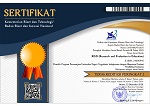Model of affective assessment of primary school students
DOI:
https://doi.org/10.21831/reid.v2i1.8307Keywords:
affective assessment, social values, elementary studentsAbstract
References
Albertus, D.K. (2012). Pendidikan karakter utuh dan menyeluruh [Whole and complete character education]. Yogyakarta: Kanisius.
Amin, A. (1988). Etika ilmu akhlak [Ethics of character science]. (M. Amin, Trans.). Jakarta: Bulan Bintang.
Anderson, L. W. & Anderson, J. C. (1982). Affective assessment is necessary and posible. Educational Leadership, April, 524-525.
Bagir, H. (2003, February 28). Gagalnya pendidikan agama [The failure of religion education]. Kompas, p. 6.
Bagus, L. (1996). Kamus filsafat [Dictionary of philosophy]. Jakarta: Gramedia Pustaka Utama.
Bandura, A. (1989). Human agency in social cognitive theory. American Psychologist, 14, 1175-1184.
Bertens, K. (1994). Etika [Ethics]. Jakarta: Gramedia.
Borg, W.R. & Gall, M.D. (1983). Educational research: An introduction. New York, NY: Longman.
Catalano, R.F., Hawkins, J.D. & Toumbourou, J.W. (2008). Positive youth development in the united states: History, efficacy, and links to moral and character education. In L. P. Nucci & D. Narvaez (Eds.). Handbook of moral and character education (pp. 459-483). New York, NY: Routledge, Taylor & Francis.
Dewantara, H. (2009). Menuju manusia merdeka [Toward independent people]. Yogyakarta: Leutika.
Ekowarni, E. (2009). Pedoman pendidikan akhlak mulia siswa sekolah dasar [Handbook of noble character education for elementary school students]. Jakarta: Departemen Pendidikan Nasional, Direktorat Jenderal Pendidikan Dasar & Menengah.
Elias, M.J., Parker, S.J., & Kash, V.M. (2007). Social-emotional learning and character and moral education in children: Synergy or fundamental divergence in our schools? Journal of Research in Character Education. 5(2), 167-181.
Feldman, R.S. (1985). Social psychology: Theories, research, and applications. New York, NY: Mc-Graw-Hill Book company.
Fornell, C. & Larcker, D.F. (1981). Evaluating structural equation models with unobservable variables and measurement error. Journal of Marketing Research, 18(1), 39-50.
Gable, R. K. (1986). Instrument development in the affective domain. Boston: Kluwer-Nijhoff.
Hair, J.F., Hult, G.T.M., Ringle, C.M., & Sarstedt, M. (2013). A primer on partial least-squares structural equation modeling (SEM-PLS). Los Angeles, LA: Sage.
Izutsu, T. (1993). Konsep-konsep etika religious dalam Alquran [Religious ethics concepts in Alquran]. (A. F. Husein, et.al., Trans.). Yogyakarta: Tiara Wacana.
Kock, N. (2013). Advanced mediating effects tests, multigroup analyses, and measurement model assessments in PLS-based SEM. Laredo, TX: ScriptWarp Systems.
Krathwohl, D.R., Benjamin, S.B., & Bertram, B.M. (1973). Taxonomy of educational objectives: The classification of educational goals. Handbook II: Affective domain. London: Longman Group.
Lickona, T. (1991). Educating for character: How our schools can teach respect and responsibility. New York, NY: Bantam Books.
Mill, J.S. (1996). On liberty. (A. Lanur, Trans.). Jakarta: Yayasan Obor Indonesia.
Ministry of National Education. (2013). Kurikulum SD/MI [Curriculum in primary schools/madrasah ibtidaiyah]. Jakarta: Kementrian Pendidikan dan Kebudayaan.
Miskawaih, A.A.A.I. (1994). Menuju kesempurnaan akhlak [The refinement of character]. (H. Hidayat & I. Hasan, Trans.). Bandung: Mizan.
Nunnaly, J.C. (1978). Psychometric theory. New York, NY: McGraw-Hill.
Center of Curriculum. (2007). Kajian kebijakan kurikulum SD [Study on primary school curriculum policy]. Jakarta: Department of National Education. Retrieved from http://www.puskur.net/download/prod2007/42_Kajian%20 Kebijakan% 20Kur%20SD.pdf.
Schiller, P. & Bryant, T. (2002). 16 Moral dasar bagi anak [16 Basis moral for children]. (S. Sensusi, Trans.). Jakarta: PT Elex Media Komputindo.
Schopenhauer, A. (1997). Menembus selubung sang maya. In F. Magnis-Suseno (Ed.). 13 Model pendekatan etika [13 approach models to ethics]. Yogyakarta: Kanisius.
Shihab, M. Q. (1999). Wawasan al-Quran: Tafsir maudhu'I atas pelbagai persoalan umat [Al-Quran insight: The exegesis of maudhu'I on people's various problems]. Bandung: Mizan.
Sholihin, M. & Ratmono, D. (2013). Analisis SEM-PLS dengan WarpPLS 3.0 untuk hubungan nonlinier dalam penelitian sosial dan bisnis [An analysis of SEM-PLS with WarpPLS3.0 for nonlinear relationship in social and business research]. Yogyakarta: Andi Offset.
Suseno, F.M. (1991). Etika politik: Prinsip-prinsip moral dasar kenegaraan modern [Political ethics: Moral principles of modern nationality basis]. Jakarta: Gramedia Pustaka Utama.
Suseno, F.M. (1993). Etika dasar: Masalah-masalah pokok filsafat moral [The nature of ethics: The main problems of moral philosophy]. Yogyakarta: Kanisius.
Tyler, R.W. (1973). Assessing educational achievement in the affective domain. Measurement in Education, 4(3), 1-8.
Van Bruinessen, M. (1995). Kitab kuning: Pesantren dan tarekat [The yellow book: Pesantren and tarekat]. Bandung: Mizan.
Watson, M. (2008). Developmental discipline and moral education. In Nucci, L.P. & Narvaez, D. (Eds.). Handbook of moral and character education (pp. 175-203). New York, NY: Routledge, Taylor & Francis.
Downloads
Published
How to Cite
Issue
Section
Citation Check
License
The authors submitting a manuscript to this journal agree that, if accepted for publication, copyright publishing of the submission shall be assigned to REID (Research and Evaluation in Education). However, even though the journal asks for a copyright transfer, the authors retain (or are granted back) significant scholarly rights.
The copyright transfer agreement form can be downloaded here: [REID Copyright Transfer Agreement Form]
The copyright form should be signed originally and sent to the Editorial Office through email to reid.ppsuny@uny.ac.id

REID (Research and Evaluation in Education) by http://journal.uny.ac.id/index.php/reid is licensed under a Creative Commons Attribution-ShareAlike 4.0 International License.







.png)





